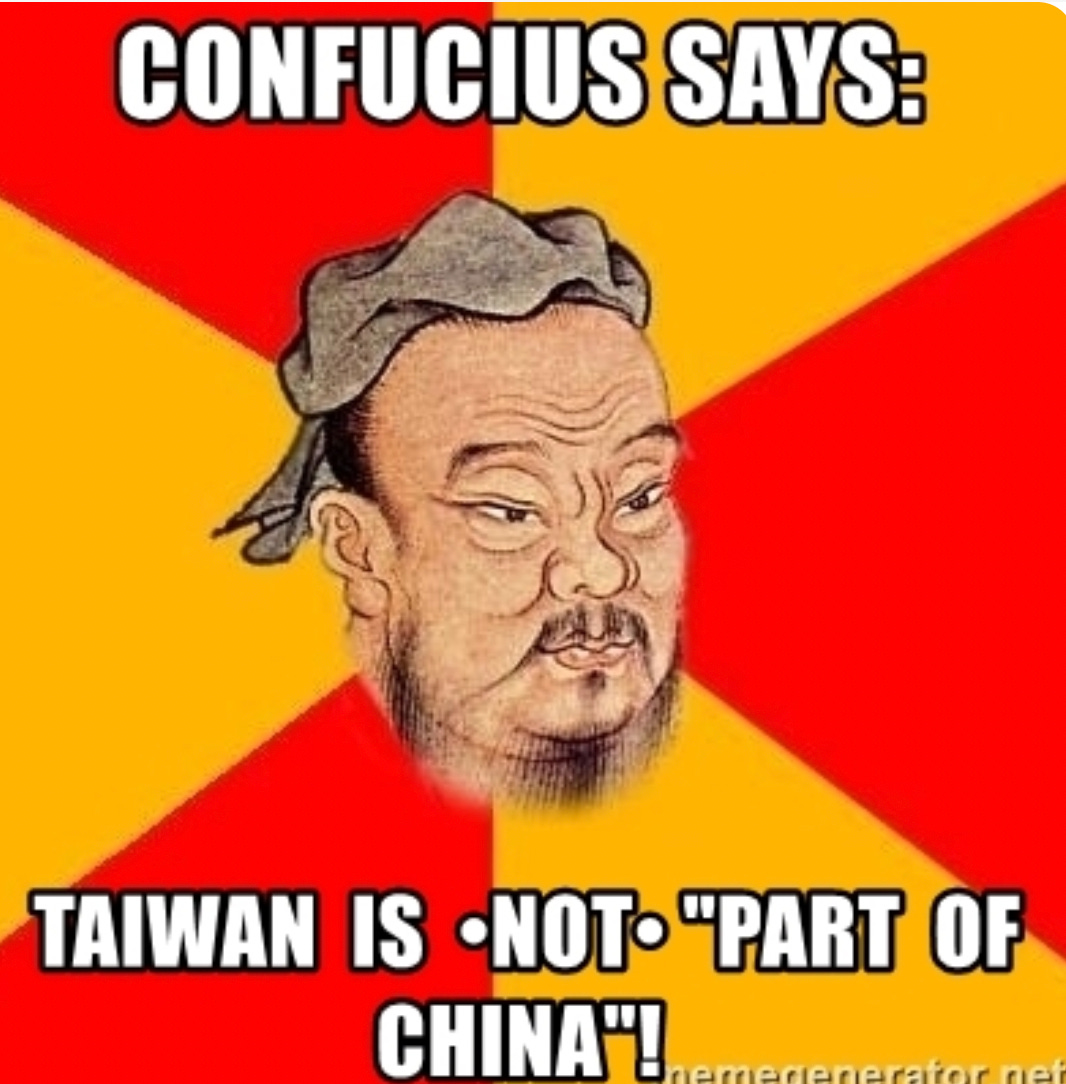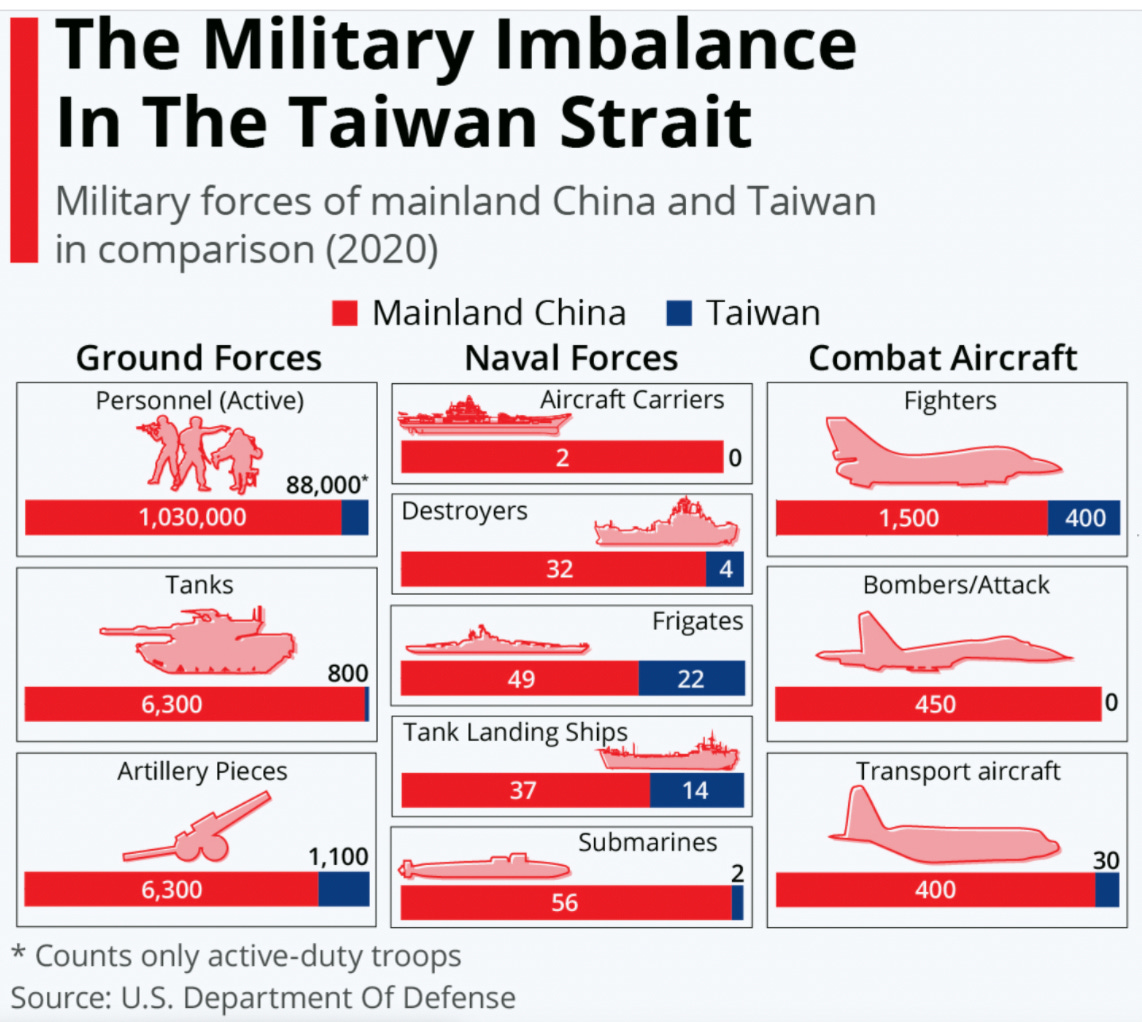The venerable magazine, The Economist, went full-on tabloid recently and declared Taiwan as “the most dangerous place on Earth” and that mainland China was about to invade. The hysteria was uncharacteristic and the thesis, frankly, unsupportable, even though there’s no doubt that the hugely successful island is in the crosshairs of the People’s Republic of China. But “most dangerous?” Surely others meet this criterion with more validity such as Ukraine, Kabul, Syria, Yemen, Central African Republic, or even Saturday nights in a sketchy American neighborhood.
China has been on a tear to consolidate its ethnicity by re-absorbing Chinese people in Hong Kong and Taiwan. Both jurisdictions are also desirable, having built prosperous economies with higher living standards than in China. So it is for this reason, Singapore should also be worried — its mostly Chinese-ethnic populace and enormous wealth is another target.
But Asia’s army of “netizens” have been posting memes pointing out that plenty of countries are on Taiwan’s side and would come to its aid. Unfortunately, this bravado is admirable but over-stated. Today, only 15 countries — none in Asia — recognize Taiwan as an independent sovereign state, though Taiwan does maintain unofficial diplomatic relations with many countries, including the US and most of its neighbors.
The countries in the best position to help Taiwan in an invasion scenario are Japan, South Korea, and the Philippines. In addition to their proximity to Taiwan, they all have their own concerns about China's rising power but have done little to criticize or abrogate China’s policy of isolating the island nation. And none have offered to sign a mutual defense treaty. Fortunately, two alliances — the G7 foreign ministers and the Quad (US, Australia, Japan, India, and a few others) — have spoken out recently and strongly against Sino aggressiveness.
Fortunately, Taiwan is already guarded by significant, non-military shields. It has built the world’s 20th largest economy by mastering cutting-edge technology essential to the world’s digital, auto, and military sectors. It dominates the semi-conductor market which is to the global economy what hemoglobin is to humans. In essence, the plucky little nation has out-strategized its gigantic neighbor by becoming an essential and irreplaceable cog in the supply chains that feed the world’s biggest economies -- the United States, Europe, Japan, and China. Ergo Taiwan is too important to fail or to become collateral damage in a war with Beijing.
Taiwan Semiconductor Manufacturing (TMS) has a whopping 55 percent market share in creating the chips that underpin the world’s economic system. Beneath this is an eco-system of hundreds of companies, a highly educated workforce, mountains of investment, and government support. What’s important to understand is that this is not like cornering the market in soybeans or Chevrolets or laptops. Lots of competitors can gear up in these markets in a matter of months.
The difference is that Taiwan’s out-sized role in chipmaking won’t go away for years, if ever. Relocation would be enormously expensive and take years. And its mastery, helped by America’s restrictions on China that reduces its ability to import tech or equipment in order to catch up, ensures its ongoing importance. For instance, the second-biggest semiconductor foundry operations are Samsung’s in South Korea and they just announced an allocation of $450 billion just to bolster their chip sector, not to overtake Taiwan’s. Taiwan Semiconductor is also four years ahead of the pack in terms of technological design and execution.
Semiconductors are the new economy’s lifeblood. In 1998, the average desktop processor, or semiconductor, consisted of roughly 7 million transistors. Today’s smartphone processors consist of seven billion transistors and their manufacture requires 100 processing steps, special skillsets, and rare or uniquely fabricated materials. Every iteration, to make them better and smaller, requires years to develop and build-out. China cannot catch up or become self-sufficient which is why the Pentagon calls it “Fortress Taiwan” — the front line against Chinese technology self-sufficiency as well as expansionism in the region.
But chips alone won’t protect it and its outsize dominance also concerns the U.S., Japan, and Europe who are pressuring TSMC to offshore some production to their countries. This is also difficult to accomplish. What’s more important for Taiwan are alliances with the United States and its neighbors. Biden has shown his support by sending a delegation to Taiwan and an invitation to its ambassador to attend his Inauguration. He is also emphasizing regional alliances to encircle and contain China such as the Quad which, along with the G7, recently issued statements calling upon China to respect boundaries and waterways across the Taiwan Strait and the South China Sea.
But Beijing regards Taiwan as an extension of China and has spent decades forcing the world to choose between the two. In 1949, after Mao Tse-Tung proclaimed the founding of the People’s Republic of China, Chiang Kai-shek, 600,000 Nationalist troops, and about two million Nationalist-sympathizer refugees retreated to the island of Taiwan and established the Republic of China. The fledgling country was booted out of the United Nations when China was recognized.
But in 1979, the Taiwan Relations Act committed the U.S. government to “make available to Taiwan such defense articles and … services in such quantity as may be necessary to enable Taiwan to maintain a sufficient self-defense capacity … to resist any resort to force or other forms of coercion that would jeopardize the security, or the social or economic system, of the people on Taiwan.”
Ever since China has done business with Taiwan, but refuses and threatens countries against giving Taiwan full-blown official diplomatic status. To counter this, the Taiwanese regularly remind the world about China’s human rights abuses and the fact that Taipei first alerted the World Health Organization to China’s COVID19 outbreak in Wuhan in January 2020, which Beijing covered up.
So what’s up with The Economist’s scare-mongering? It seems to be predicated on the musings of U.S. Admiral Phil Davidson, who heads the Indo-Pacific Command and told Congress in March that he worried about China attacking Taiwan as soon as 2027. That certainly is cause for concern, but Beijing’s bellicosity is also uniting those in the region worried about China. The oppression in Hong Kong, the Uyghur situation, military skirmishes with India, and China’s involvement in the coup d’etat in Myanmar that overthrew a democratic regime have raised tensions. The neighbors are concerned and should be. Divided they will be picked off one by one.
That is why all of them must stand behind Taiwan. So should everyone. And Taiwan should be admitted to the United Nations.
My newsletters will arrive in your inbox Monday and Thursday mornings, sometimes more often.








Actually, you have just confirmed why China WILL take Taiwan militarily if necessary. Semiconductor technology.
Globalization . . . Such a sexy word 30 years ago when China was a third world Country . . .
Today Chinese 'Cheap Labor' rules the World Economy.
We other 19 members of the G-20 have let this happen.
China buys and processes 30% of Global Commodities.
Environmentalism in the West made that a reality . . . We cleaned up our 'back yards'.
We will have to spend trillions of $ . . . IF . . . we want to regain control of our economies again.
Saber rattling is NOT an option !
Jim Le Maistre